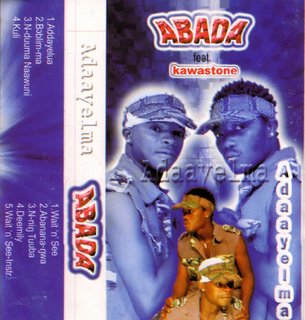Monday, March 05, 2007
Happy 50th Birthday, Ghana: Obrafour's classic song "Kwame Nkrumah"

On March 6, 1957, the Gold Coast gained independence from Britain. In 1960, Dr. Kwame Nkrumah became independent Ghana's first president.
One of my alltimme favorite Ghanaian rappers—Obrafour—pays tribute to Nkrumah and his legacy in the Song "Kwame Nkrumah". Despite his eventual downward sprial into controversial policies and behavior, Nkrumah remains a huge figure in African poilitcal history.

The song is off Obrafour's first album. It's not the first song with conscious lyrics to become a hit, but it is one of the most memorable.
In honor of Ghana's 50 years of independence I thought I'd show you all this classic hiplife clip, "Kwame Nkrumah" by Obrafour:
Check out Obrafour's myspace page.
Friday, March 02, 2007
CDs for Cedis: Making Money Doing Hiplife

"So why did you get into hiplife?"
"Well, I had been watching these music video clips from abroad and I thought it just looked so cool. Tupac, Biggie, Ja Rule...Now we have our own style."
"Of course. But why else did you start doing hiplife?"
"Because I wanted to make some money, be a big guy like Obour, Tic Tac, Tinny..."
Some people get into hiplife for the (perceived) opportunity of making money. One of the most common things I heard from people involved with hiplife was that the music industry (hiplife in particular) is providing the youth with all kinds of employment. Ghana is about to celebrate 50 years of independence (on March 6), but most of the older folks I know in Ghana have told me that the standard of living is worse now than it was in the mid-to-late 1960s. So it comes as no surprise that so many student-age young people see hiplife as a viable employment option.
The music industry in Ghana is really it's own thing altogether. Pretty much everything is curiously different from what goes on in not only N. America and Europe but neighboring places like Nigeria, Cote d'Ivoire, and Mali. Think about where you're from and how the music scene is there and consider this:
What many people the world over know as the "executive producer," i.e. the guy with the money, is known in Ghana as simply the "producer." A small difference, but this was confusing to me at first. I thought producer refers to someone involved with actual music making, the creative end of things. Not the case in Ghana, where the producer is the guy who puts up the money for an artist to record his album.
These guys have written their own rules to the music business, Ghana-style. Considering the fact that most hiplife producers lack a background in music or entertainment, it's not that surprising. One cool thing about hiplife is that it provides a platform for amateur performers to grow into professionals with a bit of energy and money. It also provides the opportunity for aspiring moguls to get their feet wet in entertainment, on the cheap. The mountains of "underground" hiplife tapes (or small-time limited distribution, usually casette-only, releases) from all over the country are made for far less than $2000 in most cases. If a song becomes a hit and the group gets lots of high-paying gigs, the producer makes some money on his investment. That's not to say making a profit is easy in the hiplife game (see below).
These producers get things done, multitasking is the name of their game. From manager to booking agent to publicist to accountant, most producers cover all the bases at once. I was told this is because of a shortage in finances, which makes it difficult to pay a different person to do each of the many jobs. And, since so many of the tasks involve greasing palms with thick wads of cash, it makes financial sense to have one person fulfill most roles at once. Payola can tap a producer's resources quickly. But it also possibly focuses all trust and money-making potential in one place. Although I don't think I have much evidence of that notion. Just a hunch...
These hiplife recordings sell 100,000 units tops, usually FAR fewer. In rare cases, hiplife cassettes have sold upwards of 400,000. If the street price of a cassette is 10,000 cedis, roughly $1.15, and there is usually a distributor or depot that's getting a cut somewhere along the way, you're not talking about enormous sales profits. CDs sell for around 75,000 cedis, or around $8.65, so there's a bit more of a profit there. But most major hiplife CDs are manufactured in England or Europe so there are extra costs involved as well.
You want your new single on the radio in one of the big cities? 1 or 2 million cedis (around $115 or $225) is often all it takes to get a B-status DJ to makes sure your shit gets spun regularly. Of course, with more than 14 radio stations in the Accra area alone, it won't be easy getting your music played by every DJ on every station, unless of course you have a truckload of Ghana's often soiled and stanky bank notes. Rumour has it that some of the big name guys and gals in urban radio are taking up to 5 million cedis to put a song in heavy rotation. Good luck with that, youngsters...
... And that's where the producer comes in. There's the all-too-common story I would hear: young person discovers his talent in the schoolyard/church/street corner, elder relative/neighbor/businessperson catches wind and a lightbulb goes on in their head and/or the young person approaches them for advice/money/support/all the above and they decide to help/invest in them. Artist and "producer" live happily/unhappily ever after (with the occasional drama and/or divorce, of course). The artist is at the complete will of the producer, who nrmally buys the rights to the album outright, thereby collecting the CD/cassette sales profits for himself.
There's a post about tv advertising and hiplife. These days, the biggest names in hiplife are making more money from product endorsement deals than record sales.
More to come.
Wednesday, January 31, 2007
Stylus Magazine
Hey... It's been a little while since I updated The Hiplife Complex with something fresh... I know, I'm lame.
Here's something new though... A starter's guide to getting into hiplife at Stylus Magazine.
If you've happened upon this place via Stylus... Welcome! A special thanks to Todd & co. at Stylus for inviting me to ramble on about hiplife in their space. Watch out for a couple hiplife podcasts curated by me here: http://stylusmagazine.com/stypod/
New posts coming very soon. Promise.
Meantime, I also keep this blog which some of you might find amusing: http://www.awesometapesfromafrica.blogspot.com
Here's something new though... A starter's guide to getting into hiplife at Stylus Magazine.
If you've happened upon this place via Stylus... Welcome! A special thanks to Todd & co. at Stylus for inviting me to ramble on about hiplife in their space. Watch out for a couple hiplife podcasts curated by me here: http://stylusmagazine.com/stypod/
New posts coming very soon. Promise.
Meantime, I also keep this blog which some of you might find amusing: http://www.awesometapesfromafrica.blogspot.com
Saturday, June 10, 2006
Hiplife Videos on YouTube
These were most likely ripped from a VCD bootleg collection of popular hiplife "clips," the kind you would buy off a guy selling them out of his backpack or a wodden kiosk in virtually any town in Ghana.
"Ahomka Womu" - VIP
VIP's classic cut, "Ahomka Womu," one which you should definitely know about. The song combines old school highlife in a really tasteful way, making it one of the biggest tracks in the last few years. The first couple verses of rhymes are dead-on with catchy phrasing. A relatively interesting video, especially near the end when the trio of rappers/singers have a 70s flashback moment complete with matching suits and afros.
The majority of music video directors in Ghana stay away from ironic or conceptual themes. There are some notable exceptions, though.
King Luu is one of the most ambitious directors in Ghana today. He has been in the business since it started back in the mid-90s, putting together over the years countless memorable clips for hiplife, gospel, and highlife artists.
"Adua No Ebu," the big-budget, high-concept video he shot for masters of irony Nkasei a few years back, exemplifies King Luu's vision. With a clip, he wants to tell a story, Luu told me one afternoon. "Adua No Ebu" depicts the slave trade in Africa and is set on a green mountain far from the homes of the urbanite rappers and production staff.
There is nothing on the web (yet) in regards to "Adua No Ebu," but the video is considered a classic. It features Reggie Rockstone to boot, who does a verse in English. The song is critical of colonialism and the post-colonial mentality. I may eventually post excerpts of my interviews about the song with the members of Nkasei and video director King Luu.
"Toffee" - Castro
This is Castro ("the Destroyer"). He's a big star now that this song is played fifty million times a day on the radio. Catchy nonetheless, using Congolese bass and drums riddim courtesy of celebrity engineer J-Que. "Toffee" is a King Luu video.
Enjoy.
"Ahomka Womu" - VIP
VIP's classic cut, "Ahomka Womu," one which you should definitely know about. The song combines old school highlife in a really tasteful way, making it one of the biggest tracks in the last few years. The first couple verses of rhymes are dead-on with catchy phrasing. A relatively interesting video, especially near the end when the trio of rappers/singers have a 70s flashback moment complete with matching suits and afros.
The majority of music video directors in Ghana stay away from ironic or conceptual themes. There are some notable exceptions, though.
King Luu is one of the most ambitious directors in Ghana today. He has been in the business since it started back in the mid-90s, putting together over the years countless memorable clips for hiplife, gospel, and highlife artists.
"Adua No Ebu," the big-budget, high-concept video he shot for masters of irony Nkasei a few years back, exemplifies King Luu's vision. With a clip, he wants to tell a story, Luu told me one afternoon. "Adua No Ebu" depicts the slave trade in Africa and is set on a green mountain far from the homes of the urbanite rappers and production staff.
There is nothing on the web (yet) in regards to "Adua No Ebu," but the video is considered a classic. It features Reggie Rockstone to boot, who does a verse in English. The song is critical of colonialism and the post-colonial mentality. I may eventually post excerpts of my interviews about the song with the members of Nkasei and video director King Luu.
"Toffee" - Castro
This is Castro ("the Destroyer"). He's a big star now that this song is played fifty million times a day on the radio. Catchy nonetheless, using Congolese bass and drums riddim courtesy of celebrity engineer J-Que. "Toffee" is a King Luu video.
Enjoy.
Saturday, April 29, 2006
Neighborhood Folk

Some places I've been reading of late (in no particular order):
-Naija Jams is your spot for info on music in Nigeria, usually hip-hop related. If you didn't hear about it last year, read about the 50 Cent's run-in with local rap star Eedris at an airport, which casued 50 to end his tour prematurely.
-Africanhiphop.com remains the central and most vital source of information on hip-hop across the continent. This cat from Holland has been running the site for years now. He mainly does a lot of research and work with Tanzanian artists.
-Benn loxo du taccu is the best African mp3 blog I know of. Matt knows his stuff!
-Also, if you're a big dork like me and still hungry for more, check African-rap.com for the latest info on African hip-hop news and events in Europe.
For those with adventurous ears and fewer Afrocentric tendencies:
-Check Woebot for thoughtful articles on everything from rare-ass vinyl to French prog and other stuff you've probably never heard of (that's good).
-Funky 16 Corners is a way daunting collection of rare funk and soul 45s with comprehensive descriptions.
-Cocaine Blunts is downright vital for rap/hip-hop heads looking for mp3s and commentary on the rappers/producers you know and love and the underground artists you wish you knew about earlier.
I have been doing an mp3 blog of sorts myself called Awesome Tapes from Africa. You'll find the occasional hiplife cut there, along with a bunch of weird and/or amazing music I have come across. Tapes must never be forgotten.
Wednesday, April 19, 2006
Peace in Dagbon, Northern Ghana?
BBC report here describes the recent funeral for the murdered King of Dagbon. Four years ago he and twenty or so of his men were slain by the rival clan vying for the throne.
Tamale, the town I've been blogging about recently, is largest town in the Dagbon traditional area in the Northern Region. Although the actual capital of the kingdom is in Yendi, a several hours down the road, Tamale is largest Dagomba town.
This BBC article is a bit sensationalist at times. But useful in gaining a broader sense of the context in which some young musicians are making serious strides.
Just check out the last few posts for more on hiplife in Northern Ghana.
Tamale, the town I've been blogging about recently, is largest town in the Dagbon traditional area in the Northern Region. Although the actual capital of the kingdom is in Yendi, a several hours down the road, Tamale is largest Dagomba town.
This BBC article is a bit sensationalist at times. But useful in gaining a broader sense of the context in which some young musicians are making serious strides.
Just check out the last few posts for more on hiplife in Northern Ghana.
Monday, April 17, 2006
A Snapshot of Popular Music in Tamale

There are so many musicians doing creative things in Tamale, Northern Region, Ghana. I wanted mention just a couple of them. Hopefully, there be time in future to devote to talking about more of these singular local artists.
I met Abada when they played a VCD (yeah, that's right. that's what's often used in Ghana) release party for one young hiplife group called B.F.G.s. Their name, which stands for Big Friendly Guys, subverts the stereotypes amongst ordinary folks that hiplife dudes are trouble. This is the first Tamale hiplife artist to release a VCD, so this show was big. Abada were part of a line-up that included most of the top Tamale musicians of the last several years. The show and after-show lasted til late. At least 10 different groups and individuals performed a mix of hiplife, their local brand of highlife, and reggae. The parking lot outside was a sea of motorbikes and ice cream sellers and all sorts of local teens. Most people ended up at another place on the other side of town where there were DJs spinning the usual mix of r&b, hip-hop, dancehall, and local sounds.
Abada, interviewed at their hang-out. An area they call Yaari ghetto. Black Moon on the right, Black Shanty on the left

Here they are on stage at the release party the night before. This is at one of the main nightlife spots in town, Picorna.
Black Moon, the the sweeter, highlife-oriented half of the vocal duo.

Black Shanty, the ragga boy with the rough and deep tones.

MC Rauf, aka Shoe Shine Boy, is one of the well-established veterans of the scene these days. I met him when I first came to Tamale in 2002 and we chatted at his barbershop. He was initially a shoe shine boy, he told me. To be a shoe shine boy is one of least desirable or profitable gigs in Ghana, but it also connotes a sort of dilligence, which Rauf seems to embody. Listen to one song, aptly titled "
I was lucky to come back to Tamale after about three years and kick it with Rauf again.
